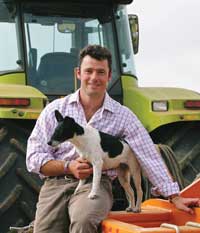Ian Pigott: Sloppy mainstream journalism is bad for farming

Several stories have put farming on the front pages in the past few weeks, but two in particular have given me great cause for consternation.
“Poisoned Spring, pesticide linked to bee deaths” read the front page of Michael McCarthy’s lead article in the Independent. An intentionally dour black-and-white page, apeing Rachel Carson’s Silent Spring, showed an image of a bee preparing to land on an oilseed rape flower. The inference being that the bee was foraging for poisoned pollen.
My initial reaction was to feel angry and somewhat hoodwinked by our industry. The article declared that neonicotinoids were to blame for the dramatic decline in bee numbers. Had I been using these chemicals, why wasn’t I made aware of the dangers and why has the farming media been silent on this issue? Worse still, McCarthy reported the USDA had been sitting on this discovery for two years.
I searched Twitter and farming and environmental websites for comments. Nothing. Why was such a big story not being reported by the farming media?
I sought counsel from one of the country’s leading bee experts. It immediately became apparent that the Independent’s “exclusive” should have been described as “exclusively Michael McCarthy’s thoughts”.
There were glaring omissions in his article.
My bee expert told me to read Dr James Cresswell’s recently published findings on this very subject. The bioscientist from the University of Exeter suggests that “field-realistic levels of these chemicals in nectar will have no lethal effects, but will reduce expected ‘foraging’ performance in honey bees by 6-20%”.
Not an entirely clean bill of health, but Dr Cresswell paints a very different picture from the one read by 600,000 Independent readers and millions more online.
It is not right that a journalist such as McCarthy can wield so much power and influence without responsibility or accountability.
Also, there was the reporting bias of the planned dairy at Nocton. Regardless of the polarity of your views, one can only have sympathy for Peter Willes and David Barnes for the media circus surrounding their proposal.
The world, its wife and probably its dog now has an opinion on “mega dairies”. Many have been influenced by inaccurate comments in the media.
Most of my non-farming friends are of the opinion that the welfare of the cows at Nocton would be compromised. Why? Because that is the inference in the media.
But why would two sane businessmen expose themselves and their families to such public scrutiny if their multi-million-pound investment was going to compromise cow welfare? Why are the public not informed of the many examples of mega dairies showing exemplary husbandry that exist around the globe?
The answer is simple: The non-farming media has slewed their reporting. Bad news sells. In my opinion, Nocton has not been allowed an impartial judgement in no small part because of ignorant misreporting.
Because journalists are not scrutinised carefully enough, many now believe, incorrectly, that they have an “informed” opinion on the root cause of bee decline or the failings of mega dairies.
Social media – a 21st century Chinese whispers on Red Bull – also enables thousands of ill-informed bloggers, tweeters and commentators to sling mud at Nocton, the chemical company in question and farming practices in general without recourse.
We have worked hard to tell the good story of British farming. And it’s unjust that ill-informed hacks can jeopardise that reputation.
Ian Pigott is 40 and farms 700ha in Hertfordshire. The farm is a LEAF demonstration unit, with 130ha of organic arable. Ian is also the founder of Open Farm Sunday.
